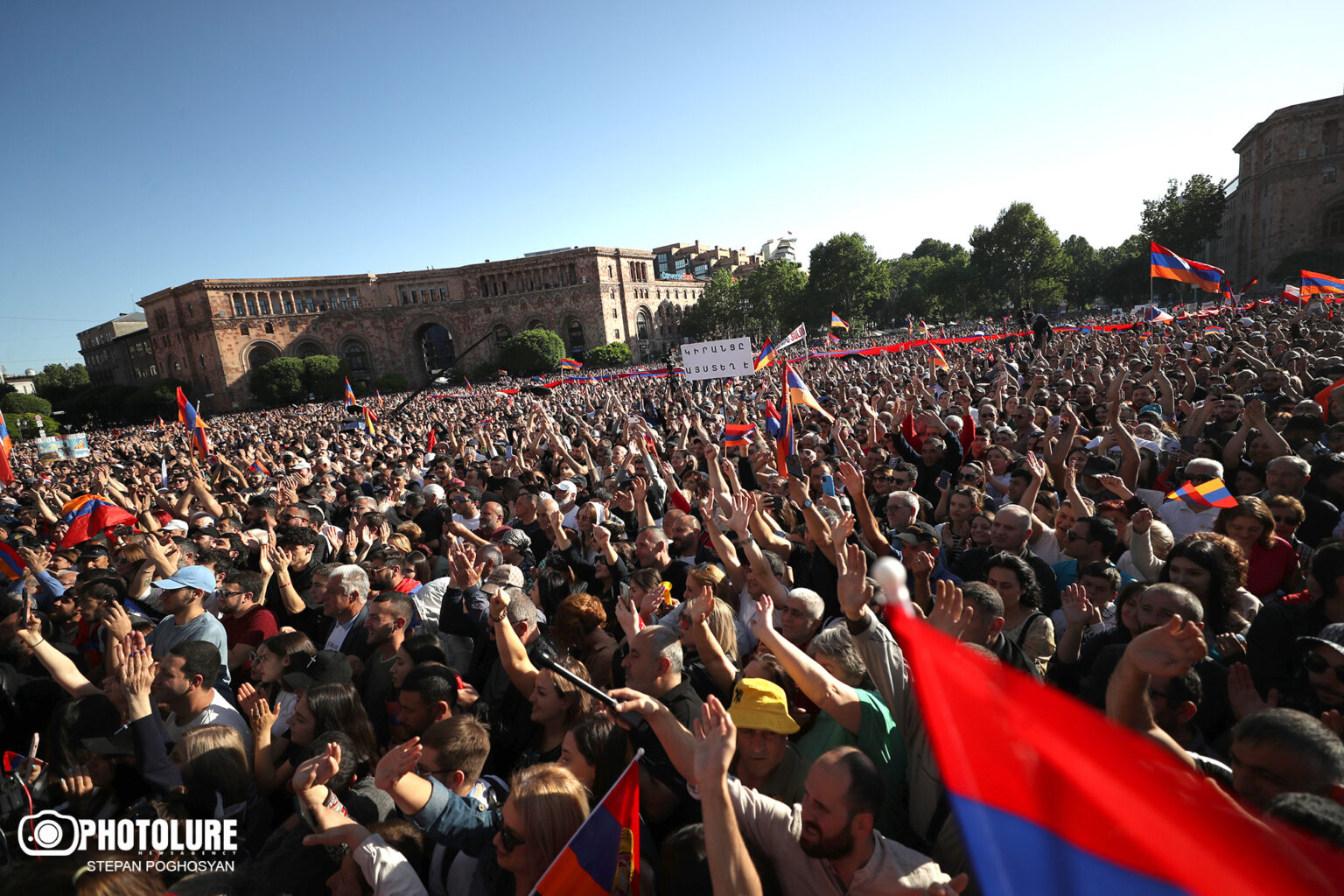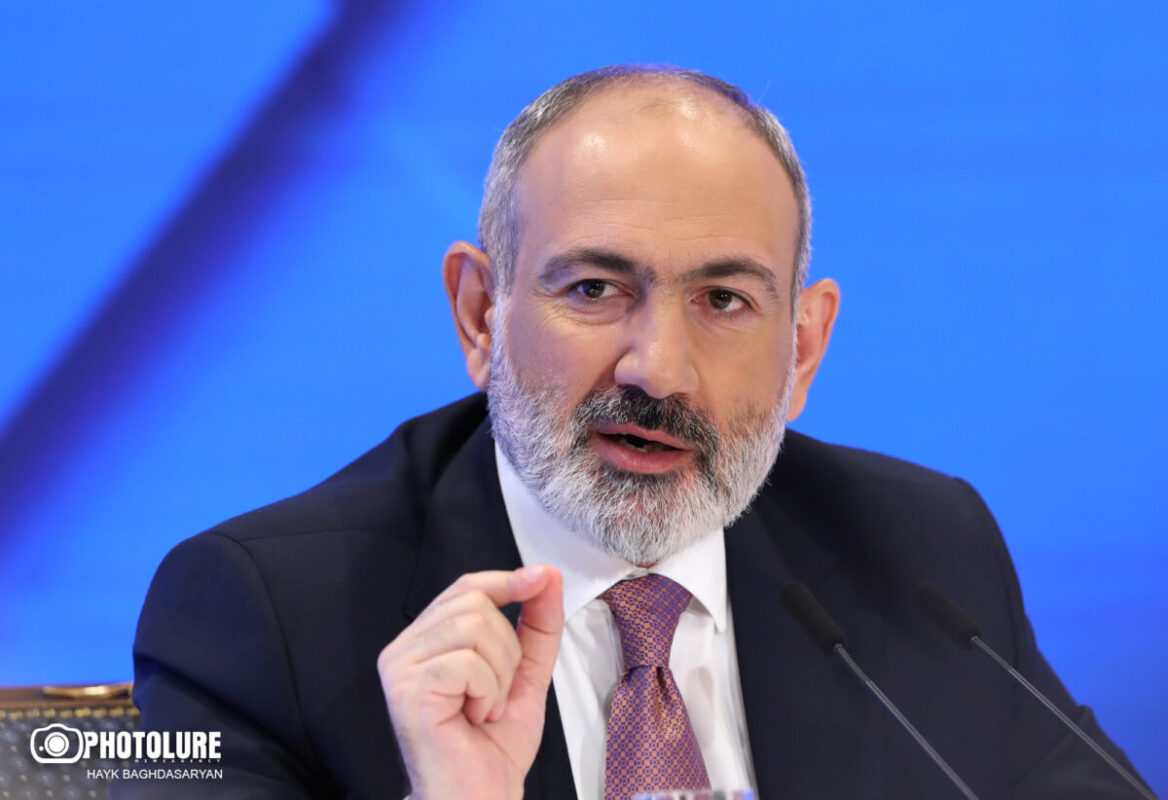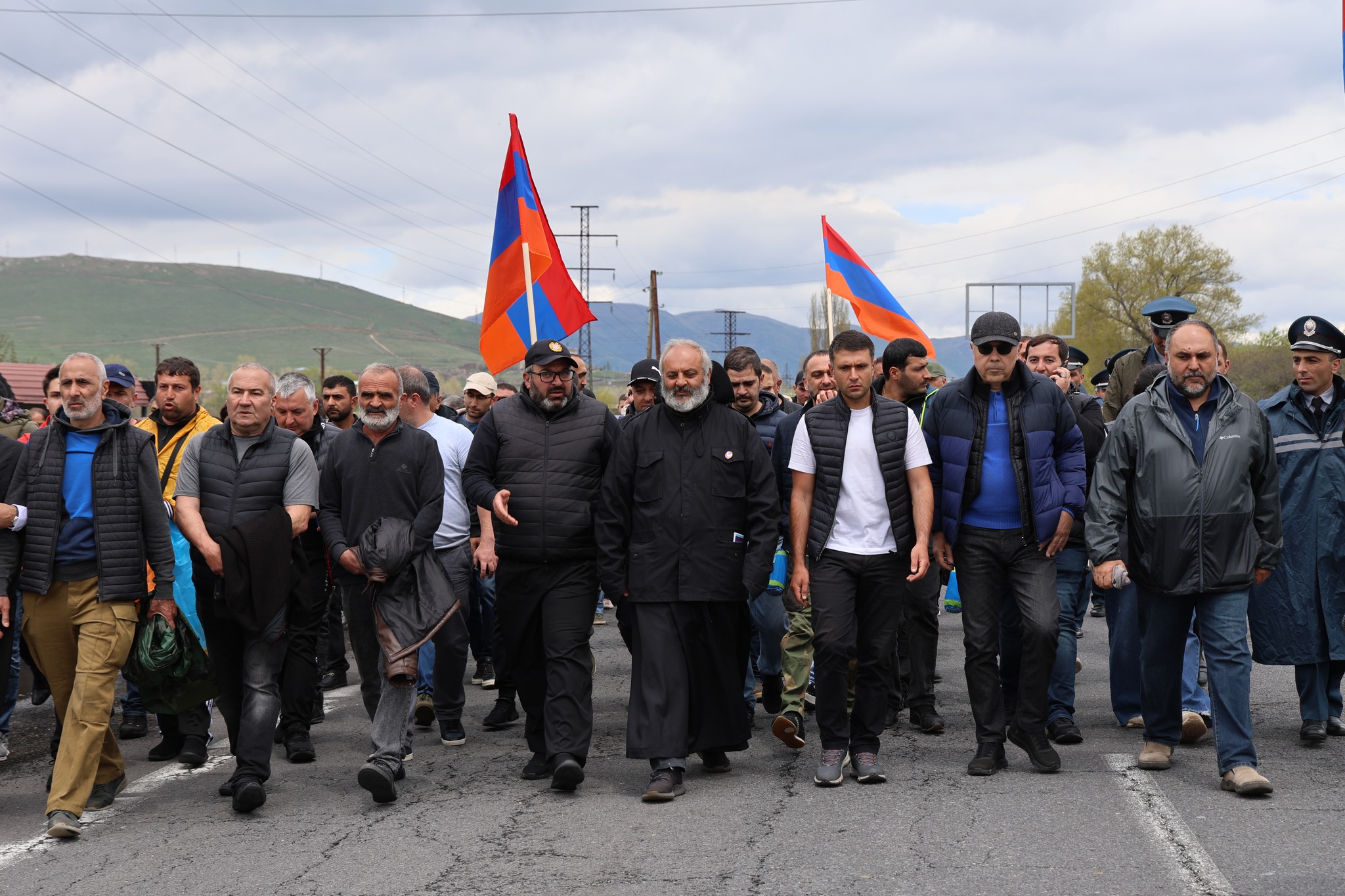"No critical mass in Yerevan's streets, there will be no PM resignation." Opinion
Armenia’s Prime minister to resign?
“Clearly, the opposition won’t achieve anything in the National Assembly. I even doubt whether the opposition can initiate the impeachment process against Armenia‘s prime minister, as both factions combined don’t hold a third of the votes,” believes political analyst Areg Kochinyan.
Both opposition factions in Armenia’s parliament have joined the “Tavush for the Sake of the Homeland” movement. Protest activists have walked from the Tavush region to Yerevan to oppose the border delimitation process with Azerbaijan. But upon reaching the capital, they declared their aim: the resignation of prime minister Nikol Pashinyan.
According to the political analyst, the movement’s strategy involves gradually escalating the situation. He thinks that after the anticipated failure in parliament, they will resort to other methods of struggle. For example, they may block streets, as was done during the “Velvet” revolution in 2018. However, as Kochinyan states, there is no longer the same societal consolidation around any agenda or political figure.
“Will the organizers and leaders of the movement be able to gather a critical mass for success? Experience shows that up to 300,000 people need to gather for this. But the footage from the recent rally was far from reaching such a figure,” said Areg Kochinyan.
According to the NGO “Union of Informed Citizens,” during the rally organized on May 9th in Yerevan, there were about 32,000 people in Republic Square and adjacent streets.
The “Tavush for the Sake of the Homeland” movement began its march on May 4th from the village of Kirants in the border Tavush region. Participants reached Yerevan from the northern border on May 9th. During the rally in the capital, the movement’s leader, Archbishop Bagrat Galstanyan, unexpectedly announced that their demand is the resignation of the prime minister. Pashinyan was given an hour to resign, but there was no reaction to the demand.
On the morning of May 10th, movement participants are staging acts of disobedience. In particular, a group of students skipped classes and walked around universities, calling for others to join them. Another rally is planned for the evening. Additionally, consultations with parliamentary factions are underway to initiate the impeachment process against the prime minister. The movement has not yet announced its candidate for this position.”
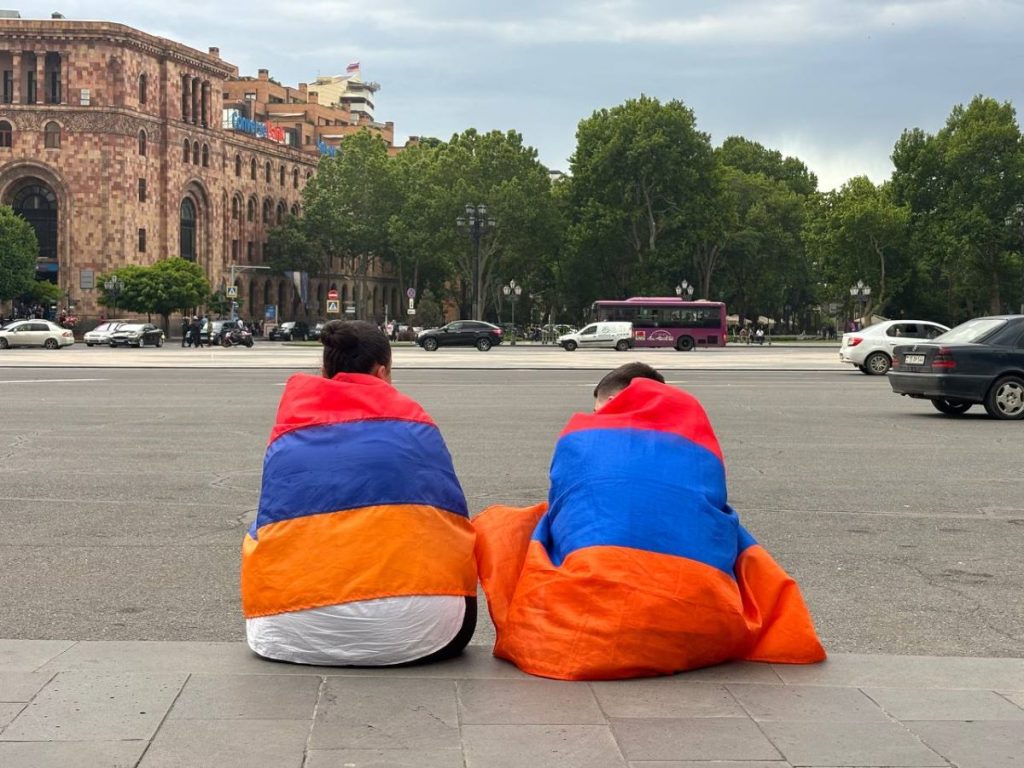
- “Baku used the issue of returning four villages as a trump card,” says Pashinyan
- Territory in exchange for peace: Will Azerbaijan refrain from a new war?
- “The border demarcation process with Azerbaijan is an adventure.” Opinion from Yerevan
Who will the opposition nominate for the post of prime minister?
According to the head of the Tavush Diocese, Archbishop Bagrat Galstanyan, ‘various candidates are being discussed,’ but no decision has been made yet.
He assured journalists that the candidacy of former Armenian president Robert Kocharyan is not being discussed.
“People have created this myth. I went to bandage my legs [after the long march in Yerevan and the May 9 rally], they said I went to meet with Robert Kocharyan. These people are liars,” he said.
Later, former Armenian foreign minister Vartan Oskanian said that Archbishop Bagrat Galstanyan is ‘on the right path’:
“At the moment, he should probably be the candidate for prime minister. This government will be temporary. Some issues will need to be addressed, after which fair elections should be held.”
In response, the archbishop stated that he has no such intentions.
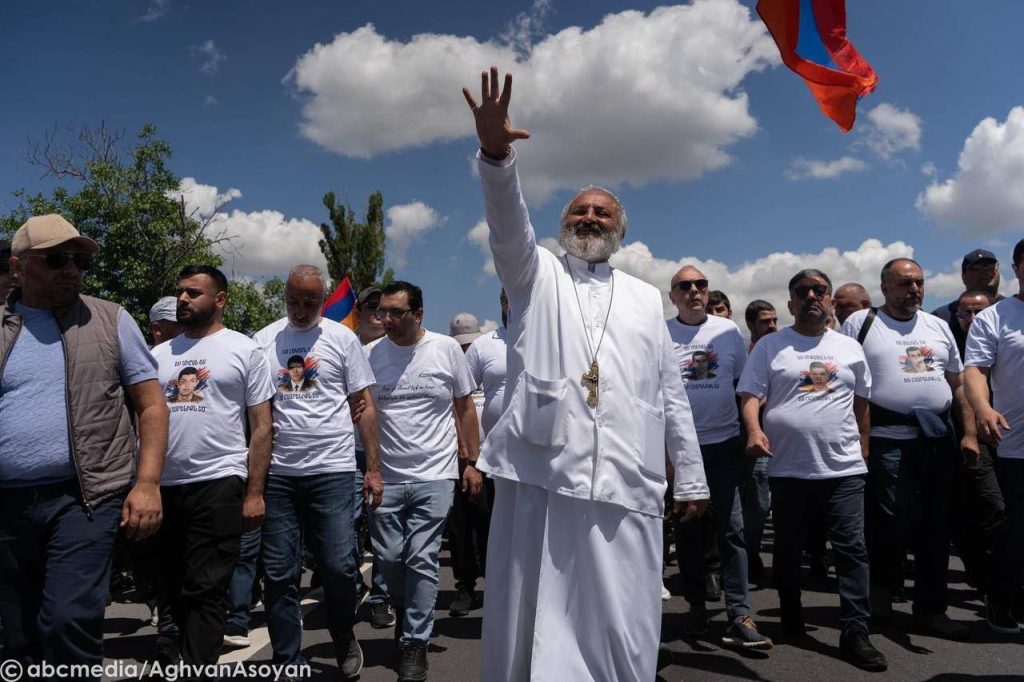
While movement participants and the opposition discuss a new candidate for the prime minister’s post, the ruling team confidently states: ‘They won’t be able to seize power, no matter how they appear – whether in a tie or in a cassock.‘
About the impeachment procedure
According to the constitution, a draft resolution expressing no confidence in the prime minister can be submitted to parliament by a group consisting of no less than one-third of the total number of deputies. This can only happen if the draft includes a new candidate for the position of prime minister.
The draft is put to a vote no earlier than 48 hours and no later than 72 hours after its submission.
The decision is made by a majority of votes from the total number of deputies. If parliament adopts the resolution, it is considered that the prime minister has already resigned.
Political analysts consider this scenario unlikely. They explain that the opposition’s votes in parliament are insufficient, and deputies from the ruling faction will not join their demand.
According to the constitution, if the draft resolution expressing no confidence in the prime minister is not adopted by the National Assembly, the next impeachment procedure can be initiated no earlier than 6 months.
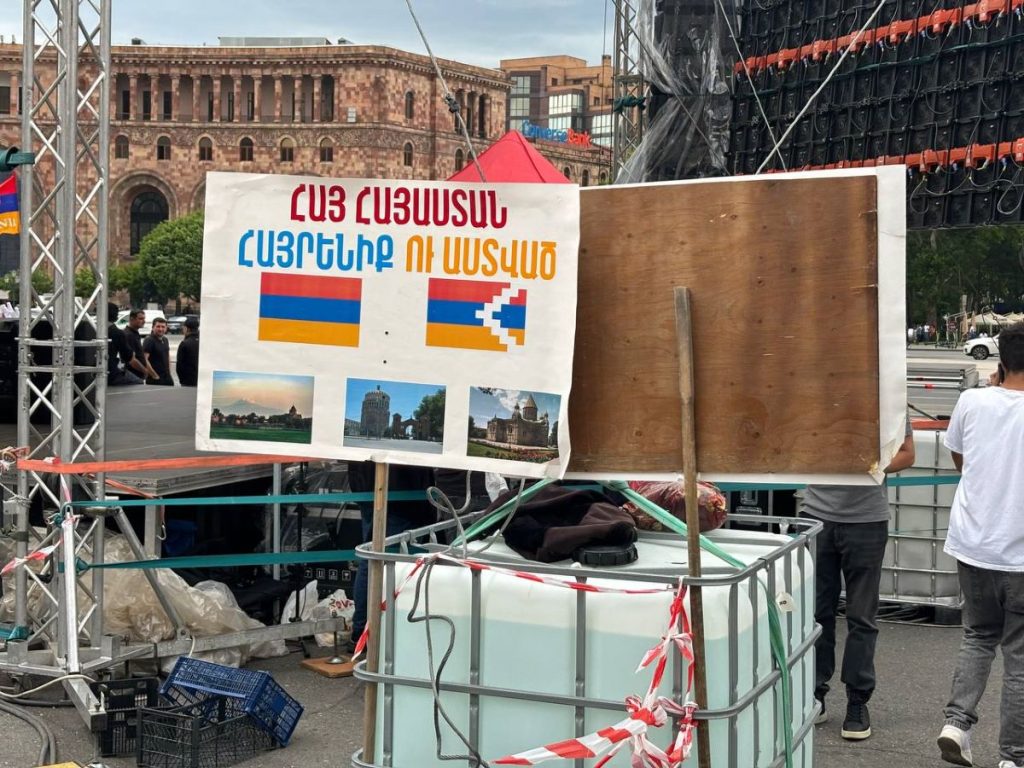
Opposition lawmakers are ready to initiate the impeachment process
The secretary of the “I Have Honor” faction, Tigran Abrahamyan, told journalists that all six members of the faction have expressed readiness to join the process of expressing no confidence in the prime minister. He assured that all 35 opposition deputies are ready to sign the form to initiate the impeachment procedure.
However, for the draft resolution to be included in the agenda, the signatures of no fewer than 36 deputies are required.
Earlier, Bagrat Galstanyan stated that deputies from the ruling “Civil Contract” faction want to join their fight. However, they themselves excluded their participation in this process.
According to deputy from the ruling faction Gagik Melkonyan, “the prime minister may take certain steps if 400,000 or more people gather in the square.”
Commentary by political analyst Areg Kochinyan
“Termination of demarcation would mean continuation of conflict”
Areg Kochinyan asserts that those opposing the demarcation and delimitation process are essentially advocating for the continuation of conflict:
“In the current situation of existing power imbalance with Azerbaijan, continuation of the conflict is likely to occur on Armenian territory.”
He argues that this isn’t about intimidating people with war, as claimed by movement participants:
“In politics, one must make calculated decisions. If you know in advance that you will lose by entering into battle, you shouldn’t engage in that battle.”
“The beneficiary of the movement is Russia”
The political analyst explains that only one country stands to benefit from prolonging the conflict – Russia, as it would mean “instability and additional Russian presence” in the region:
“In the 1990s, Armenia was Russia’s ally because it won the war. Now it’s Azerbaijan. But in the South Caucasus, Russia has one ally – conflict.”
In his opinion, the beneficiary of the protest movement is the Russian Federation, regardless of whether its participants want to serve Moscow’s interests.
He characterizes relations with Russia as follows:
“Either you give everything to the Russians, or they beat you. If there are people in Armenia who think that the state’s image can be restored by giving everything to the Russians, then these people are deeply mistaken.”
Kochinyan warns that continuing the conflict will mean Armenia’s establishment of irreversible Russian dominance and dictatorship.
“Armenia has not lost any territories”
He stated that Armenia has not relinquished any of its territories to Azerbaijan at the moment. Regarding the return of four villages adjacent to the Tavush region to Azerbaijan, he explained that the Armenian army temporarily occupied them in the 1990s for security reasons. However, after demarcation, it will be not a frontline but a border. This is precisely why Armenian armed forces have been withdrawn from there:
“Rumors that someone is handing over parts of Voskepar or Kirants [villages in the Tavush region] to the opponent are outright lies, misinformation.”
“Both sides are withdrawing their forces”
The political analyst reminded that the heads of Tavush villages have already reported the withdrawal of Azerbaijani forces from certain sections of the border by 10, 20, 30 meters. In the logic of demarcation, mutual concessions are made, and both sides retreat to their territory:
“Movement participants are trying to instill the belief in society that tomorrow Azerbaijan will not make any concessions and will not withdraw [from Armenian territories where Azerbaijani armed forces have advanced]. They are trying to turn this into political capital and come to power.”
Kochinyan himself does not believe that if demarcation and border delineation started with problematic territory for the Armenian side, Baku will not withdraw its troops from other areas, such as the southern border – towards Jermuk.










